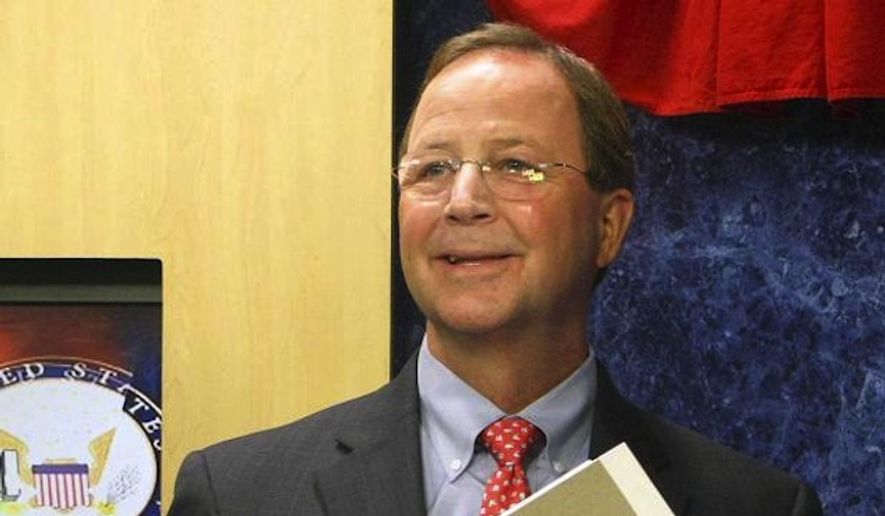House conservatives unveiled another alternative to Obamacare Thursday, insisting market-oriented changes are better than the 2010 law’s mandates and subsidies as Republicans try to coalesce around a permanent replacement.
Members of the Republican Study Committee said the Affordable Care Act has been a “breathtaking and spectacular failure,” adding millions to the insurance rolls without reducing health costs or linking patients to doctors.
“Access to a waiting line is not access to health care,” said Rep. Andy Barr, Kentucky Republican and one of five RSC members to unveil the plan.
Their replacement, the American Health Care Reform Act, would eliminate Obamacare’s coverage standards and wouldn’t force people to buy insurance. Republicans would instead try to entice customers to sign up for plans by offering individuals the same tax deduction that businesses get for offering plans to their employees.
The bill would allow people to stash more money in tax-advantaged Health Savings Accounts and set aside $15 billion to defeat Alzheimer’s and other diseases, reasoning that cures would result in massive savings over time.
But the RSC members said their plan is not the short-term “fix” that many say will be needed if the Supreme Court later this month strikes down Obamacare’s subsidies in King v. Burwell. Justices are deciding whether the IRS has unlawfully paid subsidies to customers in 34 states that declined to set up their own health exchanges.
Without the subsidies, Obamacare customers would find their plans unaffordable, sending insurance markets into a tailspin as healthier customers drop coverage.
Congressional Democrats have lambasted the GOP’s alternatives as lackluster and unnecessary, pointing to 16 million Americans who’ve gained coverage under Obamacare. They also say there is no need to forge a back-up plan for the King decision, arguing Congress never intended to treat the states differently and that the justices will see it the same way.
“The partisan opponents of the Affordable Care Act have shown they will stop at nothing to undo the law and take away health coverage from millions of Americans,” Sen. Chris Murphy, Connecticut Democrat, said last week. “Not only is King v. Burwell their last hope, but it’s a miracle the Supreme Court took up the case to begin with.”
Republicans hope to use the court’s ruling as a bridge to 2017, when a GOP president and majorities in Congress would let them repeal and replace Mr. Obama’s signature law. But they haven’t decided whether to lock in Obamacare’s subsidies for a short period — so affected Americans don’t twist in the wind — or refuse quick fixes and make the administration deal with the mess, the result of poorly drafted language in its signature law.
“We still have multiple opinions about how to deal with the issue,” RSC Chairman Bill Flores, Texas Republican, said.
Rep. Austin Scott, Georgia Republican, said he would not extend the subsidies unless Mr. Obama acquiesced to some of the GOP’s reforms. Mr. Barr, though, said he’d be open to a temporary extension of the subsidies to minimize harm.
Mr. Flores said while the RSC didn’t get “into the weeds” on that issue, it feels any transition from the King decision should pay for the subsidies with existing Obamacare revenue instead of new taxes. It should also repeal the law’s insurance mandates and coverage requirements, he said.
With its bill, the RSC joined House Budget Chairman Tom Price, Georgia Republican who filed an Obamacare replacement earlier this year, and Sens. Orrin Hatch of Utah, Richard Burr of North Carolina and House Energy and Commerce Chairman Fred Upton, who’ve issued their own blueprint.
Both chambers, meanwhile, are trying to use a fast-track budget tool known as “reconciliation” to take a swipe at President Obama’s law.
A Republican aide said Thursday they still think they can use the procedure to send a full repeal bill to the White House, even though Politico this week reported the Senate parliamentarian is unlikely to permit any attempt at full repeal, as reconciliation provisions must fit into strict budget rules.
Other legislative aides told The Washington Times it is too soon to say how GOP-led committees will attack the law under reconciliation, citing the King decision’s impact on their approach. No matter the outcome, Mr. Obama would veto any repeal bill that made it to his desk.
The administration, defending its signature law, urged holdout states Thursday to expand Obamacare’s reach by extending Medicaid coverage to more poor Americans.
Twenty-one states have declined the federal government’s offer to pay for 100 percent of the expansion through 2016, a share that scales down to 90 percent by 2020 and beyond.
The White House’s Council of Economic Advisers said more than 12 million people been covered under Medicaid or the Children’s Health Insurance Program since Obamacare launched in earnest in fall 2013, and that 5,200 deaths could be avoided each year if the rest of the states expanded Medicaid.
• Tom Howell Jr. can be reached at thowell@washingtontimes.com.




Please read our comment policy before commenting.